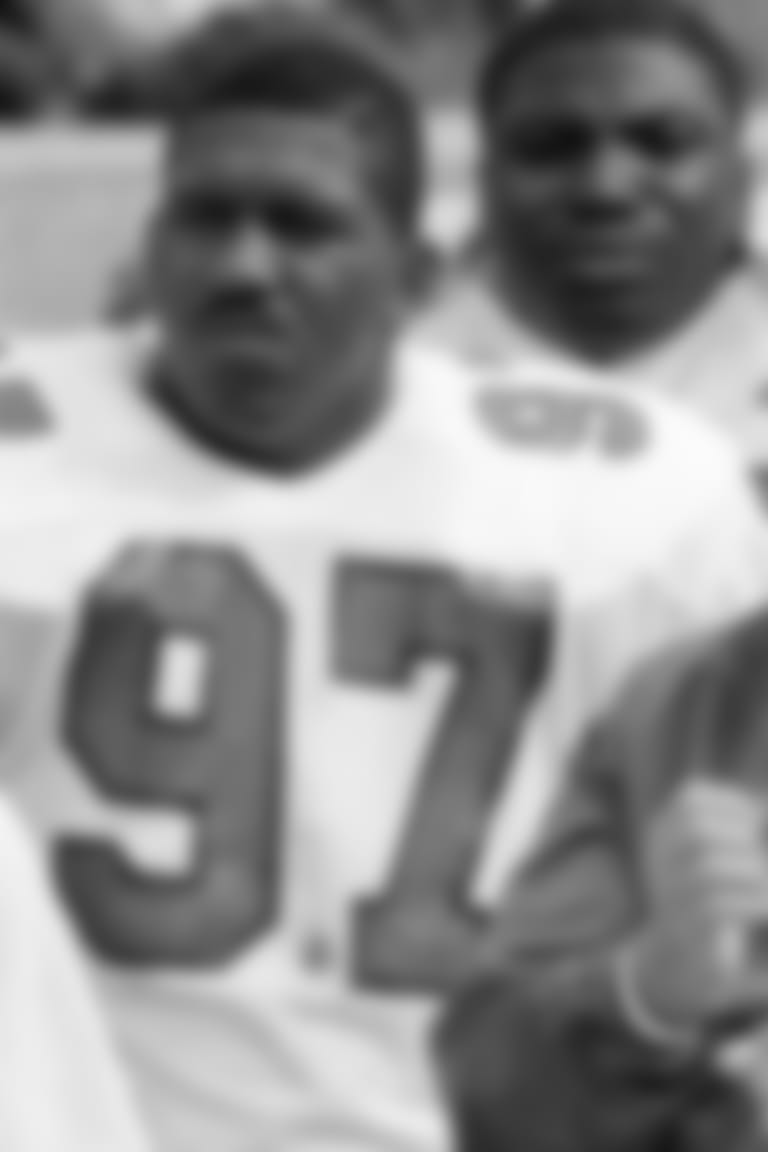Return Game: Birds, 'Boys, and Bad Blood, presented by NovaCare Rehabilitation, is the sweeping story of the Eagles and Cowboys Rivalry. Arguably one of the greatest contributors to the Birds and 'Boys rivalry, Buddy Ryan loved to stir the pot, and fans delighted in what he was cooking. They loved his rift with Tom Landry, they loved it when he would disparage the team in the press, and they loved it even more when he led the team in some of the most iconic games of the mid-to-late 1980s.
This episode is packed full of drama and includes revenge plots, a changing of the guard in Dallas, more payback, and snowballs. Buddy really left his mark on this rivalry.
INTRODUCTION
MERRILL REESE: I don't think he purposely ran up the score. But he put regular Cowboys out there on the field, so much better than the ragamuffins who were playing for the Eagles at that time.
SETH JOYNER: I can remember being on the picket line and the scabs were brought in and I can remember the Teamsters almost flipped over these huge buses.
MIKE QUICK: I run into the end zone and he tries to throw me a pass. And usually, it's gonna catch teams completely off guard.
SETH JOYNER: Luis is dazed. And he is stumbling, he's dizzy. And he is like, kind of stumbling and leaning towards our sideline.
RAY DIDINGER: As soon as the Cowboys came out the tunnel, the fans started throwing snowballs at the Cowboys.
ROB ELLIS: Welcome to Return Game: Birds, 'Boys, and Bad Blood, presented by NovaCare Rehabilitation. I'm Rob Ellis.
DERRICK GUNN: And I am Derrick Gunn. If you've just discovered us, welcome!
ROB ELLIS: And if you haven't already listened to some of our earlier episodes, this is a great time to go back and get caught up. They are worth the time!
DERRICK GUNN: Some see the late 1980s era of the Eagles-Cowboys rivalry as the pinnacle. The reason: Both teams and fans packed so much hatred for each other into such a short amount of time. It was really quite impressive!
BUDDY NOT FRIENDLY WITH SCABS
ROB ELLIS: It's 1987. Buddy Ryan is the Eagles' head coach. He had one year in Philly under his belt. Before landing in the City of Brotherly Love, Coach Ryan had a successful and sometimes tumultuous run as the Chicago Bears' defensive coordinator. Back when he worked for the Bears, Ryan was actually hired by Papa Bear George Halas. The Birds had wrapped Buddy's first season 5-10-1. Not the best showing, but the team was going through a transition as Buddy implemented the culture he would become known for. His second season in charge got off to an unconventional start. We pick up our story up in Week 2 of the 1987 campaign.
CLYDE SIMMONS: I just knew we weren't playing. So you know what, I'm going home and let y'all figure this out and not come back (until) it's time to play. And that's basically what I did.
ROB ELLIS: The NFL players had walked out and decided to strike because, put simply, they wanted free agency. Clyde Simmons went along with it. But then something changed.
CLYDE SIMMONS: And then I was watching television and watching the circle around Veteran Stadium with the unions and all that stuff. And then it started grasping on to me how important this was to have freedoms and choices.
ROB ELLIS: Simmons came back to Philly to join teammates like Seth Joyner on the picket lines.
"Buddy just stood off to the side and twirled his whistle. He wouldn't coach these guys because he didn't want to give that much credibility to these games." Ray Didinger
SETH JOYNER: The entire team pretty much decided to stay out. It was not very well looked upon to be crossing picket lines. And there was a massive picket line in which a lot of the players participated. We, as a team, made the decision that we were all going to go in together because of what our fan base was like, and what they stood for. And we had to represent them throughout that situation.
ROB ELLIS: So you had players picketing outside stadiums across the country. Huge crowds gathered at some sites and caused a headache for the NFL. There had been a players strike in 1982, but back then, the league stopped games during the standoff. But this time was different. The league decided to find a different solution.
DERRICK GUNN: The solution was to recruit replacement players to play as long as the strike continued. It was the first time in the history of professional sports in the U.S. that replacements would take the field. These guys were considered "no-names" and "has-beens." Plucked from obscurity and thrown onto the field.
SETH JOYNER: I can remember being on the picket line and the scabs were brought in. They couldn't just drive into the stadium. The owners had to have them bused every day for practice. And I can remember the Teamsters almost flipped over these huge buses as they were driving into Veterans Stadium for these guys to practice. But you know, that's the way they had to get them in, or it wouldn't have ended well for the scabs, trying to come in and cross the picket line.
RAY DIDINGER: Nobody liked the idea of replacement football. All the coaches knew that it was a farce and a mistake. But a lot of coaches took the attitude that, "OK, look, I'm going to do the best I can with these guys. I'm going to try and coach them. I'm going to try and make them into a team. I'm going to go out. I'm still going to try and win games."
ROB ELLIS: But not Buddy Ryan.
RAY DIDINGER: In the three weeks that they were together, they were on a practice field, but Buddy just stood off to the side and twirled his whistle. He wouldn't coach these guys because he didn't want to give that much credibility to these games.
ROB ELLIS: Instead of these physically and mentally tough NFL players, like Joyner, the Eagles' squad was made up of these replacements. But in Dallas, the situation was different.
FUEL TO THE FIRE
MERRILL REESE: Quite a few of the Cowboys had crossed the picket line.
DERRICK GUNN: Kristi Scales is a Dallas Cowboys sideline reporter. She has been with the Dallas Cowboys radio network for over 30 years. Scales says the '87 squad didn't have much of a choice.
KRISTI SCALES: Tex Schramm, the Cowboys' team president and general manager, really put the screws to the most popular and best players on the team. I'm talking about Randy White and Tony Dorsett, as well as the starting quarterback Danny White, guys like Everson Walls. Those guys actually crossed the picket line. And it's because Tex had threatened to take away their future player annuities.
DERRICK GUNN: Shortly after the strike started, Ryan had to face Landry with his half-real and half-pretend Cowboys at Texas Stadium.
MERRILL REESE: And they just battered the Eagles' replacement players.
ROB ELLIS: One player beating up the Birds was a kicker named Luis Zendejas. Zendejas joined the Cowboys as a replacement player. He accounted for 11 points in that game.
DERRICK GUNN: File the name Zendejas away, you'll be hearing about him again.
ROB ELLIS: While the Eagles were getting thrashed, Ryan thought that perhaps Landry was "running up the score."
MERRILL REESE: He put regular Cowboys out there on the field, so much better than the ragamuffins who were playing for the Eagles at that time. They weren't NFL-quality players. So did he run up the score? He didn't have to run up anything. They just dominated the Eagles. They were just totally outmanned.
DERRICK GUNN: Kristi Scales has a different perspective.
KRISTI SCALES: It was late in the game and the Eagles had a chance to get on the scoreboard again. And so the Cowboys already had 41 points and the game was in hand. But by sending Randy White and "Too Tall" Jones back into the game to stop the replacement Eagles from getting a late score, it helped fuel the acrimony between the teams.
ROB ELLIS: It sure did Kristi!
DERRICK GUNN: The final score – Cowboys 41, Eagles 22.
RAY DIDINGER: They were scoring touchdowns and they beat the Eagles badly. And Buddy just stood on the sidelines steaming, watching this whole thing. So that when the game was over, the Cowboys won, of course, because they had all the good players. And Buddy walked off, you know, shaking his head. Fully determined that one day we get his revenge. And he did.
DERRICK GUNN: The 1987 strike lasted 26 days. It set the tone for a rocky few years between the Eagles and Cowboys with games that really highlighted the rivalry. And the revenge was stoked by Buddy Ryan.
ROB ELLIS: After the strike ended and the Eagles were back together, Coach Ryan was in his element.

Eagles players including Randall Cunningham, Mike Quick, and Reggie White teamed up for a song with the chorus, "Buddy's Watching You," a tribute to the head coach.(AP Photo/George Widman)
WITH BUDDY, YOU KNEW WHERE YOU STOOD
MIKE QUICK: He was happy because Buddy loved his players. And he didn't want to coach the replacement players.
ROB ELLIS: That's Mike Quick. Quick was a wide receiver for the Eagles from 1982 through 1991. It was common knowledge that Coach Ryan favored the defense over his offense, but number 82 made it into Ryan's good book.
MIKE QUICK: He was great to me. And so Buddy, there's no ambiguity. You knew, Buddy loves you. Buddy does not like you. And there's really not much gray area there. He understood me. He liked the way I play because I know every day I'm gonna come to work. And he appreciated that in me, and many of the offensive guys, but he took care of me. In fact, he told the defensive guys when we were in live stuff, like, don't hit 82. He didn't want me to get hurt because he needed me on Sundays. So, Buddy took good care of 82.
ROB ELLIS: Number 82 would come to be remembered for his part in what unfolded next.
KRISTI SCALES: Buddy Ryan and Tom Landry were polar opposites. Landry was always placid. In fact, he was known as the plastic man, you know, he didn't show a lot of emotion at all. And then Buddy Ryan was the opposite. He was fiery, and he was the perfect archetype of an old-school football coach.
DERRICK GUNN: It's true, Ryan and Landry were so different. And it was this personality clash that helped fuel the rivalry in the late '80s. Landry was a clean-cut military guy. Always dressed to perfection – jacket, tie, and fedora.
ROB ELLIS: Ryan, a military man himself, resembled a feisty bulldog who knew just how to rile up his players, coaches, and Eagles fans.















